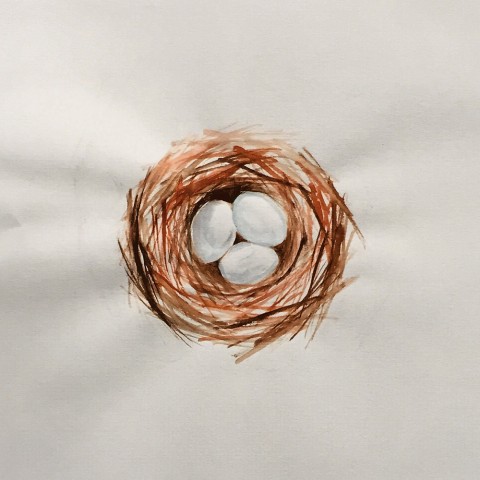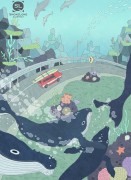In the meantime, they would stay in the house. They loved it and it was theirs; neither would leave it. But they had run out of money and the work had stopped and they could not do any more or live alongside each other any longer. Nick went to the basement where the boxes were fortressed. He was sleeping in his old pup tent, a familiar dome in the wilderness, and reading through his comic book collection once again. Amelia went to the attic where her books and papers settled under the eaves in unruly drifts. At night she read by the light of the moon and the Coleman lantern they had gotten as a wedding present.
On the middle floor was the space where the kitchen would have been: the refrigerator that had once anchored a wall now adrift in a sea of linoleum; the unfinished countertop running beneath a row of windows that overlooked a stand of oak trees, the wooded land that had called to them before the house itself. A cluster of abandoned tools huddled in a corner amidst blueprints and receipts and cans no one had thrown away. The claw-foot tub Amelia had found in a salvage yard lay in wait beside her grandmother’s wardrobe, which still smelled of Keri cream and chardonnay. This was the floor where they had lived together all those months, their mattress like a raft on a vast stage, as the house had retreated and grown around them.
The weather was changeable and intrusive, the wind rattling the old single-paned windows, the rain beading on the inside of the panes, the heat settling in like an occupation. They heard dogs barking on both sides, the trucks that got lost on the way to the highway, the rustle and rush of the trees against the siding. But when the crash came, a thunderous crack like something from the sky itself, it was plainly nothing they had heard before. Nick was just getting home from work, Amelia was upstairs. They hadn’t spoken in nearly two weeks. Still, he called to her. “Milly? Milly? Are you OK?” He wondered if he had caused the damage somehow, if the door’s slamming had broken the frame, or the front gate had fallen in and brought the ancient railing down with it.
“I’m here,” Amelia said. She might have been whispering; her ears were ringing, the room pinwheeled around her. When she stood from her chair glass rained onto her feet.
“I’m coming up,” Nick said, throwing off his briefcase and mounting the ladder that led to the attic. He felt, absurdly, like a knight or a scout leader, a father going to defend his flock.
“No,” she said, but it might not have been aloud. There was an eerie hush in the room: the broken glass twinkling in the sunlight, the pricks of blood on her hands and thighs as fine as jewels. And then she saw it, brazen and impossibly wild: the tree. They had planned on building a tree house in this tree. They had planned on partitioning the attic into bedrooms, on bunk beds and bedtime stories, holiday dinners full of revelry, art projects and dress-up baskets and a dog with a perky tail.
“You’re bleeding,” he said. She flinched but didn’t look at the cuts. She was wearing shorts and slippers; her brow was furrowed, her skin flushed. He could hardly remember what had turned between them.
“You’re here,” she said. When he held a hand to her cheek she saw his wedding ring, firmly in place. She had put hers in the tooth pillow she had found in a trunk from home and tucked it away. Her finger felt shamefully, thrillingly bare now, in a way that made her long for her younger self, for the girl with tangled hair and smudged freckles who had believed in magic, who had vowed against marriage to a mortal man, an ordinary life.
“Holy shit,” Nick said. The tree was everywhere, shipwrecked across the floorboards, wood upon wood and all wrong. He walked, gingerly, to the edge of the house, which gaped open beyond him, a sheer drop to the camellias below, to the neighbors’ fence, to the stretch of trunk that remained upright and grievously broken.
Amelia’s book was spread open on the chair, the pages glittering with glass. He saw her pen, her glasses folded to the side. If the chair had fit in the alcove, she would have put it there right beneath the window—her favorite place in the whole house—and when the tree fell through, it would have fallen through her too. He could see it now, the falling and falling, one part to the next. They had to leave.
She was kneeling by the trunk, surveying the branches as if she were going to climb the tree like this. He put a hand on her back; he could hear a soft creaking.
“We have to go down,” he said. Even now, the “we” warmed him.
“There’s something here,” she said. Beneath a gnarled branch she saw a thicket of brush and reached for it. Wouldn’t that be a stroke of enchantment: a nest, delivered in this improbable way? She imagined eggs, the palest blue with speckled constellations, yolky heartbeats that could be saved. The forest was as dark and beautiful as she had suspected, and it had come to them—to her—as she had always hoped.
“Now,” he said, sharply. She must not be hearing it: the whine of the floorboards, the wood bowing beneath the tree’s tremendous weight. He pulled her toward the ladder, her slippers scudding behind her, her hair flicking into his mouth. Something rose in her, a flare of longing, of recognition, tender and luminous, and she leaned against him as they climbed, limbs knocking the rungs, down and down, as if they might still find their way back, before the floor gave and the house fell all around them.

Notes from Guest Reader Benito Vergara
I love the deft way the writer uses a house, unfinished, to stand for the dynamics of an interrupted marriage. The story is so beautifully crafted, from the beginning that’s really an aftermath, to the poignant ending.


 The core workshop of SmokeLong Fitness is all in writing, so you can take part from anywhere at anytime. We are excited about creating a supportive, consistent and structured environment for flash writers to work on their craft in a community. We are thrilled and proud to say that our workshop participants have won, placed, or been listed in every major flash competition. Community works.
The core workshop of SmokeLong Fitness is all in writing, so you can take part from anywhere at anytime. We are excited about creating a supportive, consistent and structured environment for flash writers to work on their craft in a community. We are thrilled and proud to say that our workshop participants have won, placed, or been listed in every major flash competition. Community works.